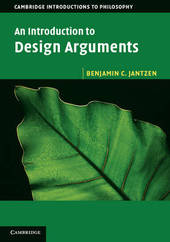
|
An Introduction to Design Arguments
Paperback / softback
Main Details
| Title |
An Introduction to Design Arguments
|
| Authors and Contributors |
By (author) Benjamin C. Jantzen
|
| Series | Cambridge Introductions to Philosophy |
|---|
| Physical Properties |
| Format:Paperback / softback | | Pages:347 | | Dimensions(mm): Height 247,Width 174 |
|
| Category/Genre | Philosophy of religion |
|---|
| ISBN/Barcode |
9780521183031
|
| Classifications | Dewey:213 |
|---|
| Audience | | Tertiary Education (US: College) | |
|---|
| Illustrations |
2 Tables, black and white; 13 Halftones, unspecified; 21 Line drawings, unspecified
|
|
Publishing Details |
| Publisher |
Cambridge University Press
|
| Imprint |
Cambridge University Press
|
| Publication Date |
27 February 2014 |
| Publication Country |
United Kingdom
|
Description
The history of design arguments stretches back to before Aquinas, who claimed that things which lack intelligence nevertheless act for an end to achieve the best result. Although science has advanced to discredit this claim, it remains true that many biological systems display remarkable adaptations of means to ends. Versions of design arguments have persisted over the centuries and have culminated in theories that propose an intelligent designer of the universe. This volume is the only comprehensive survey of 2,000 years of debate, drawing on both historical and modern literature to identify, clarify and assess critically the many forms of design argument for the existence of God. It provides a neutral, informative account of the topic from antiquity to Darwin, and includes concise primers on probability and cosmology. It will be of great value to upper-level undergraduates and graduates in philosophy of religion, theology, and philosophy of science.
Author Biography
Benjamin C. Jantzen is Assistant Professor of Philosophy at Virginia Tech. He has published papers in journals including Proceedings of the National Academy of Sciences, Biophysical Journal, Philosophy of Science, and Synthese. His work on formal methods in the philosophy of religion has been published in Transactions of the Charles S. Peirce Society and in the anthology Probability in the Philosophy of Religion (2012).
|